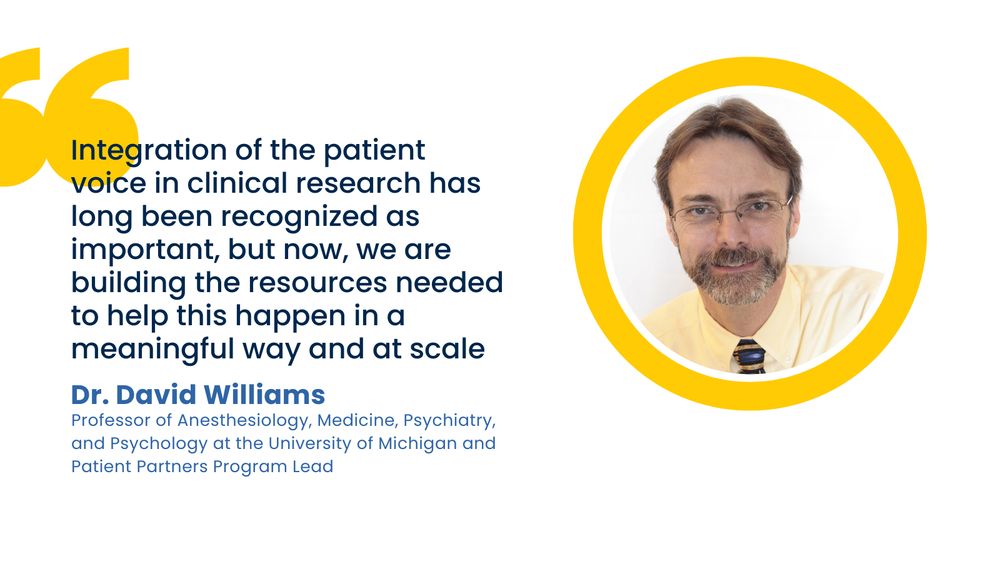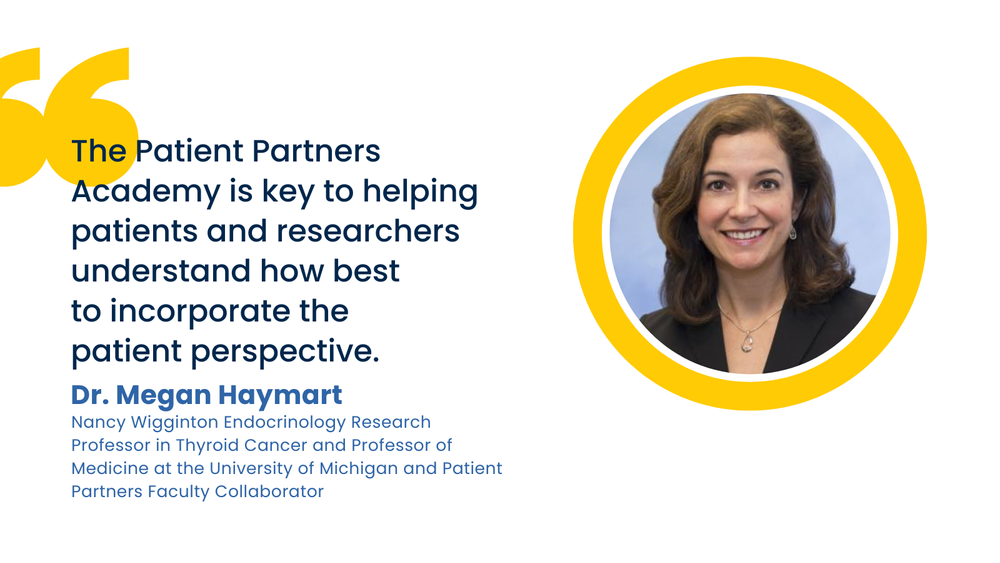Building New Paradigms Together: Engaging Patient Partners in Research

Patients, the ultimate stakeholders in clinical and translational research, haven’t always had a seat at the table for conducting research studies. Research teams and funding agencies are increasingly recognizing that patients with lived experience bring a unique and valuable point of view for every stage of a research study – starting with study creation. MICHR’s Patient Partners Program was founded to advance the integration of patient partners into study teams and research leadership with the goal of accelerating innovation and translational science, increasing the relevance of research findings, and improving health outcomes and patient empowerment.
“For researchers who are also clinicians, patients often inspire their research focus and direction. The potential to involve patients in the research process is exciting,” says Megan Haymart, the Nancy Wigginton Endocrinology Research Professor in Thyroid Cancer and Professor of Medicine at the University of Michigan and Patient Partners faculty collaborator.
The Patient Partners team recognizes that adding a patient to a research team is just the beginning. Many patients who want to help don’t know how to participate in a research study, and many researchers don’t know how to integrate a patient successfully into their study team. MICHR is developing the Patient Partner Academy (PPA) to alleviate barriers to successful patient participation in research studies. The PPA will provide training for patients and researchers on how to fully engage patients as partners on the study team and as mentors to increase patient leadership in clinical and translational research.
“Integration of the patient voice in clinical research has long been recognized as important, but now, we are building the resources needed to help this happen in a meaningful way and at scale,” says David Williams, Professor of Anesthesiology, Medicine, Psychiatry, and Psychology at the University of Michigan and Patient Partners Program Lead.

Patient Partners Program Co-Lead Greg Merritt, Ph.D. brings years of experience as a patient partner in research to the team. After he experienced a sudden cardiac arrest and a heart attack in 2012, he was gifted what he refers to as his “second life.” Participating in research studies as a patient, he recognized both the benefits of having a patient involved in research and the challenges patients face entering the world of research. This led to him founding Patient is Partner, LLC, to advance the development of authentic relationships between patients and researchers. He explains how bringing a patient onto a research study without an understanding of ways to integrate their unique experience and perspective into the work of a study team can lead to a frustrating experience for all involved.
An anonymous patient partner agreed, saying, “I’ve been a patient partner on a few research studies. I’ve never received any training, I just had to learn as I went along. It would be amazing to prepare patients to partner in research by teaching them about research and academic culture, timelines, funding, and research methods. Imagine how much more impactful patient partners could be with this preparation.”
The PPA is being designed to offer that preparation in hopes of making that collaboration more effective, meaningful, and enjoyable for all involved.
“The Patient Partners Academy is key to helping patients and researchers understand how best to incorporate the patient perspective,” says Haymart.

Currently, the Patient Partners team is conducting community engagement studios and listening sessions with patients who have served as partners in research studies. They plan to soon get feedback from a larger group of patients through a mailed survey. By incorporating patients’ ideas and goals at this stage of the PPA development, the team will design a curriculum that will not only help get patients on research teams but also ensure that patients and researchers have the tools needed to make the collaboration rewarding and effective.
“I hope that as a result of the academy, we build new tables to do research collaboratively rather than simply asking patient partners to come to the researcher’s table. How might we build new paradigms together?” Merritt asks.

For more info contact Knoll Larkin, Patient Partners Program Officer.